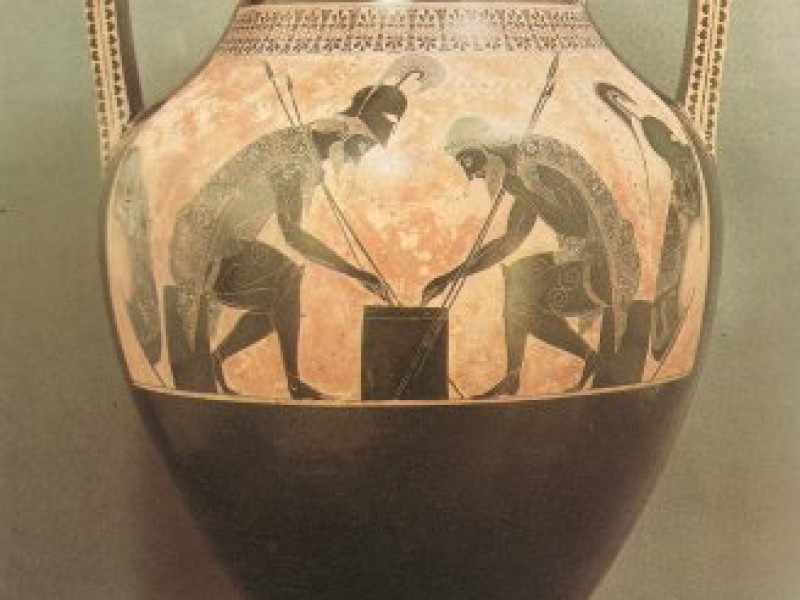Philoctetes
A Malian archer. Philoctetes (Φιλοκτήτης) was the son of Poeas, king of Malis, and Demonassa. He may have sailed with Jason as an Argonaut.
Either Philoctetes or his father set alight Heracles' pyre. Heracles rewarded him by giving his bow and arrows to Philoctetes.
As a former suitor of Helen, Philoctetes brought seven ships with him from the city of Methone and Meliboea. In his journey to Troy, Philoctetes did not make it to Troy with the rest of the Greek army.
When they landed on the island of Tenedos, Philoctetes was bitten by a poisonous water snake. Though Philoctetes did not die from the poison, the Greek physicians had problems curing him. The bite remained infected, and the wound started giving such an unpleasant stench that the Greek army abandoned him on the island of Lemnos. The Malians were commanded by Philoctetes' lieutenant, Medon, the son of Oileus and Rhene.
It seemed strange because the island should not have been deserted; yet Philoctetes had to live on the island, hunting and gathering food on his own for nine years without meeting anyone.
For nine years, Philoctetes' wound had not healed, and he had to live in agony and loneliness. Philoctetes barely survived from starving on the meagre food of small birds and animals.
There are several versions of how Philoctetes finally rejoined the Greek army with the bow of Heracles.
According to the Little Iliad, when Odysseus captured the Trojan seer named Helenus, they learned that Troy could not fall without the bow of Heracles. Diomedes brought Philoctetes back from Lemnos, and the archer-king was healed by Machaon the son of Asclepius. Philoctetes used his arrow to kill Paris. At Paris' death, Helen was given to Deïphobus (Deiphobus), Paris' brother, in marriage.
According to Apollodorus, it was Calchas, the Greek seer, who prophesied that Troy could not fall unless the bow of Heracles was brought to Troy. Odysseus and Diomedes went to Lemnos and gained possession of the bow by trickery. Philoctetes rejoined the Greek army and was healed. The first victim of Philoctetes arrow was Paris.
At Paris' death, Helenus and Deiphobus contended with one another for the hand of their brother's widow in marriage. The Trojans favoured Deiphobus' claim over Helenus. So they awarded Helen to Deiphobus. Helenus angrily left Troy, and was captured by Odysseus.
The best-known version comes from the play of Sophocles, called Philoctetes. The Trojan seer named Helenus revealed to the Greeks that one of the requirements of winning the war was that the bow of Heracles needed to be brought to Troy.
Odysseus used young Neoptolemus to manipulate Philoctetes into giving the bow to Neoptolemus. Instead of then giving the bow to Odysseus, Neoptolemus took pity on the helpless Philoctetes by returning the bow to him.
Philoctetes would have killed Odysseus had the god Heracles not intervened. Heracles told Philoctetes to forgive Odysseus and the other Greek leaders who had abandoned him on the island, and to rejoin the Greek army.
Whichever version you prefer, Philoctetes was healed by Machaon. The first enemy Philoctetes killed was Paris and Deiphobus married Helen.
Philoctetes was among the heroes who were hidden within the belly of the Wooden Horse (Trojan Horse). He killed Admetus during the sacking of Troy.
According to Apollodorus, Philoctetes and his followers were driven to Campania in Italy. Philoctetes fought against the Lucanians in a war before settling in Crimissa in southern Italy.
Related Information
Name
Philoctetes, Φιλοκτήτης.
Sources
The Iliad was written by Homer.
The Cypria and Little Iliad were part of the Epic Cycle.
Philoctetes was written by Sophocles.
Library was written by Apollodorus.
Metamorphoses was written by Ovid.
By Jimmy Joe

